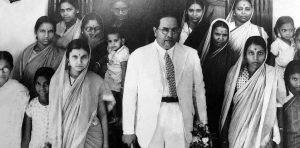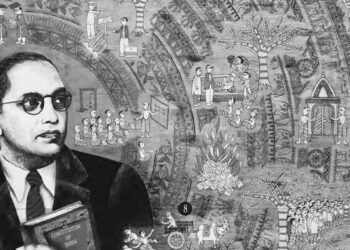
(Submitted by Dr. Bhimrao R. Ambedkar and
Rao Bahadur R. Srinivasan as Sub-Committee’s Report at the Second Round Table Conference held in London, 1931)
The following are the terms and conditions on which the Depressed Classes will consent to place themselves under a majority rule in a self-governing India:
Condition No. I
Equal Citizenship
The Depressed Classes cannot consent to subject themselves to majority rule in their present state of hereditary bondsmen. Before majority rule is established their emancipation from the system of untouchability must be an accomplished fact. It must not be left to the will of the majority. The Depressed Classes must be made free citizens entitled to all the rights of citizenship in common with other citizens of the State.
(A) To secure the abolition of untouchability and to create the equality of citizenship, it is proposed that the following fundamental right shall be made part of the Constitution of India:
Fundamental Right
“All subjects of the State in India are equal below the law and possess equal civic rights. Any existing enactment, regulation, order, custom or interpretation of law by which any penalty, disadvantage, disability is imposed upon or any discrimination is made against any subject of the State on account of untouchability shall, as from the day on which this Constitution comes into operation, cease to have any effect in India.”
(B) To abolish the immunities and exemptions now enjoyed by executive officers by virtue of sections 110 and 111 of the Government of India Act, 1919 and their liability for executive action be made co-extensive with what it is in the case of a European British Subject.
Condition No. II
Free Enjoyment of Equal Rights
It is no use for the Depressed Classes to have a declaration of equal rights. There can be no doubt that the Depressed Classes will have to face the whole force of orthodox society, if they try to exercise the equal rights of citizenship. The Depressed Classes therefore feel that if these declarations of rights are not to be mere pious pronouncements but are to be realities of everyday life then they should be protected by adequate pains and penalties from interference in the enjoyment of these declared rights.
(A) The Depressed Classes therefore propose that the following section should be added to Part XI of the Government of India Act, 1919, dealing with Offences, Procedure and Penalties:
(i) Offence of Infringement of Citizenship
“Whoever denies to any person except for reasons by law applicable to persons of all classes and regardless of any previous condition of untouchability the full enjoyment of any of the accommodations, advantages, facilities, privileges of inns, educational institutions, roads, paths, streets, tanks, wells and other watering places, public conveyances on land, air or water, theatres or other places of public amusement, resort or convenience whether they are dedicated to or maintained or licensed for the use of the public shall be punished with imprisonment of either description for a term which may extend to five years and shall also be liable to fine.”
(B) Obstruction by orthodox individuals is not the only menace to the Depressed Classes in the way of peaceful enjoyment of their rights. The commonest form of obstruction is the social boycott. It is the most formidable weapon in the hands of the orthodox classes with which they beat down any attempt on the part of the Depressed Classes to undertake any activity if it happens to be unpalatable to them. The way it works and the occasions on which it is brought into operation are well described in the Report of the Committee appointed by the Government of Bombay in 1928 ‘to enquire into the educational, economic and social condition of the Depressed Classes (untouchables) and of the Aboriginal Tribes in the Presidency and to recommend measures for their uplift’. The following is an extract from the same:

Depressed Classes and Social Boycott
“102. Although we have recommended various remedies to secure to the Depressed Classes their rights to all public utilities we fear that there will be difficulties in the way of their exercising them for a long time to come. The first difficulty is the fear of open violence against them by the orthodox classes. It must be noted that the Depressed Classes form a small minority in every village, opposed to which is a great majority of the orthodox who are bent on protecting their interests and dignity from any supposed invasion by the Depressed Classes at any cost. The danger of prosecution by the Police has put a limitation upon the use of violence by the orthodox classes and consequently such cases are rare.
“The second difficulty arises from the economic position in which the Depressed Classes are found today. The Depressed Classes have no economic independence in most parts of the Presidency. Some cultivate the lands of the orthodox classes as their tenants at will. Others live on their earnings as farm labourers employed by the orthodox classes and the rest subsist on the food or grain given to them by the orthodox classes in lieu of service rendered to them as village servants. We have heard of numerous instances where the orthodox classes have used their economic power as a weapon against those Depressed Classes in their villages, when the latter have dared to exercise their rights, and have evicted them from their land, and stopped their employment and discontinued their remuneration as village servants. This boycott is often planned on such an extensive scale as to include the prevention of the Depressed Classes from using the commonly used paths and the stoppage of sale of the necessities of life by the village Bania. According to the evidence sometimes small cause suffice for the proclamation of a social boycott against the Depressed Classes. Frequently it follows on the exercise by the Depressed Classes of their right to the use of the common well, but cases have been by no means rare where a stringent boycott has been proclaimed simply because a Depressed Class man has put on the sacred thread, has bought a piece of land, has put on good clothes or ornaments, or has carried a marriage procession with the bridegroom on the horse through the public street.
“We do not know of any weapon more effective than this social boycott which could have been invented for the suppression of the Depressed Classes. The method of open violence pales away before it, for it has the most far-reaching and deadening effects. It is the most dangerous because it passes as a lawful method consistent with the theory of freedom of contact. We agree that this tyranny of the majority must be put down with a firm hand if we are to guarantee the Depressed Classes the freedom of speech and action necessary for their uplift.”
In the opinion of the Depressed Classes the only way to overcome this kind of menace to their rights and liberties is to make social boycott an offence punishable by law. They are therefore bound to insist that the following sections should be added to those included in Part XI of the Government of India Act, 1919, dealing with Offences, Procedure and Penalties:
I. Offence of Boycott Defined
(i) A person shall be deemed to boycott another who—
(a) refuses to let or use or occupy any house or land, or to deal with, work for hire, or do business with another person, or to render to him or receive for him any service, or refuses to do any of the said things on the terms on which such things should commonly be done in the ordinary course of business, or
(b) abstains from such social, professional or business relations as he would, having regard to such existing customs in the Community which are not inconsistent with any fundamental right or other rights of citizenship declared in the Constitution, ordinarily maintain with such person, or
(c) in any way injures, annoys or interferes with such other person in the exercise of his lawful rights.
Ii. Punishment for Boycotting
Whoever, in consequence of any person having done an act which he was legally entitled to do or of his having omitted to do any act which he was legally entitled to omit to do or with intent to cause any person to do any act which he is not legally bound to do or to omit to do any act which he is legally entitled to do, or with intent to cause harm to such person in body, mind, reputation or property, or in his business or means of living, boycotts such person or any person in whom such person is interested, shall be punished with imprisonment of either description for a term which may extend to seven years or with fine or with both:
Provided that no offence shall be deemed to have been committed under this section if the Court is satisfied that the accused person has not acted at the instigation of or in collusion with any other person or in pursuance of or in collusion with any other person or in pursuance of any conspiracy or of any agreement or combination to boycott.
(Source: Dr. Baba Saheb Ambedkar, Writings and Speeches, Vol.2, Part III, Ch. 4, Appendix I)
To be continued in the next issue…








